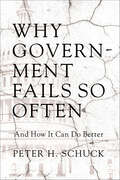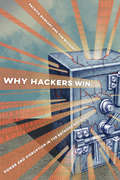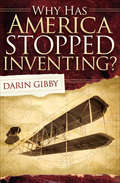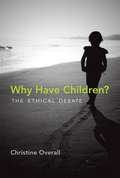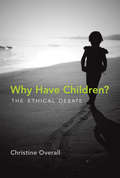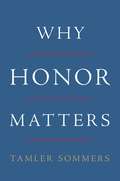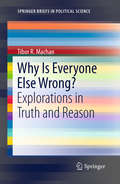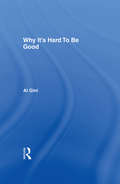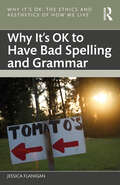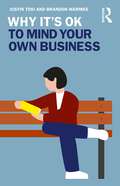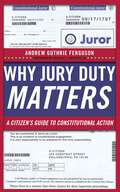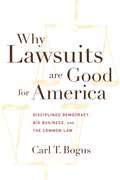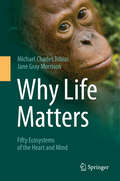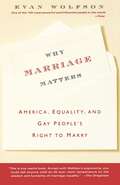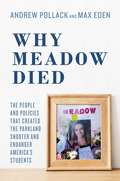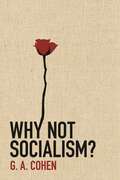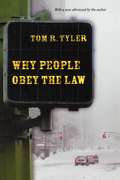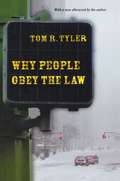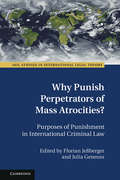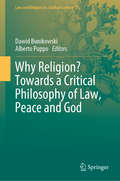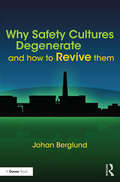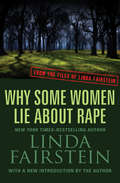- Table View
- List View
Why Government Fails So Often: And How It Can Do Better
by Peter H. SchuckHow government can implement more successful policies, more oftenFrom healthcare to workplace and campus conduct, the federal government is taking on ever more responsibility for managing our lives. At the same time, Americans have never been more disaffected with Washington, seeing it as an intrusive, incompetent, wasteful giant. Ineffective policies are caused by deep structural factors regardless of which party is in charge, bringing our government into ever-worsening disrepute. Understanding why government fails so often—and how it might become more effective—is a vital responsibility of citizenship.In this book, lawyer and political scientist Peter Schuck provides a wide range of examples and an enormous body of evidence to explain why so many domestic policies go awry—and how to right the foundering ship of state. An urgent call for reform, Why Government Fails So Often is essential reading for anyone curious about why government is in such a disgraceful state and how it can do better.
Why Governments and Parties Manipulate Elections
by Alberto SimpserWhy do parties and governments cheat in elections they cannot lose? This book documents the widespread use of blatant and excessive manipulation of elections and explains what drives this practice. Alberto Simpser shows that, in many instances, elections are about more than winning. Electoral manipulation is not only a tool used to gain votes, but also a means of transmitting or distorting information. This manipulation conveys an image of strength, shaping the behavior of citizens, bureaucrats, politicians, parties, unions, and businesspeople to the benefit of the manipulators, increasing the scope for the manipulators to pursue their goals while in government and mitigating future challenges to their hold on power. Why Governments and Parties Manipulate Elections provides a general theory about what drives electoral manipulation and empirically documents global patterns of manipulation.
Why Hackers Win: Power and Disruption in the Network Society
by Patrick Burkart Tom McCourtWhen people think of hackers, they usually think of a lone wolf acting with the intent to garner personal data for identity theft and fraud. But what about the corporations and government entities that use hacking as a strategy for managing risk? Why Hackers Win asks the pivotal question of how and why the instrumental uses of invasive software by corporations and government agencies contribute to social change. Through a critical communication and media studies lens, the book focuses on the struggles of breaking and defending the “trusted systems” underlying our everyday use of technology. It compares the United States and the European Union, exploring how cybersecurity and hacking accelerate each other in digital capitalism, and how the competitive advantage that hackers can provide corporations and governments may actually afford new venues for commodity development and exchange. Presenting prominent case studies of communication law and policy, corporate hacks, and key players in the global cybersecurity market, the book proposes a political economic model of new markets for software vulnerabilities and exploits, and clearly illustrates the social functions of hacking.
Why Has America Stopped Inventing?
by Darin GibbyA thoughtful look at our history of innovation, the problems with the patent system, and the prospects for America&’s future. America loves innovation and the can-do spirit that made this country what it is—a world leader in self-government, industry and technology, and pop culture. Everything about America has at one point or another been an experiment and a leap of faith. And one such experiment—upon which all others depend for success—is the US Patent System. Why Has America Stopped Inventing? takes a close look at why this experiment appears to be failing, and why America has all but stopped inventing. Our belief that we are the most innovative people on earth is mistaken. Statistics show that today we invent less than half of what our counterparts did a hundred and fifty years ago. Where are the groundbreaking inventions comparable to those from the Industrial Revolution? Why have we been using the same mode of transportation for over a century? Why are we giving trillions to hostile foreign nations for imported oil when we have the talent to solve the nation&’s energy crisis? We don&’t have these desperately needed technologies because regular Americans have given up on inventing. This book explains why, comparing the experiences of America&’s most successful nineteenth-century inventors with those of today and sharing fascinating historical anecdotes: Jefferson refusing to waste any more weekends examining patent applications; Whitney being robbed of his fortune while the South&’s wealth exploded; the patent models that kept British soldiers from burning Washington&’s last-standing federal building; the formation of Lincoln&’s cabinet; and Selden crippling the entire US auto industry. It also tells the story of the Wright brothers&’ airplane monopoly, the Colt revolver&’s role in the Mexican American War, the Sewing Machine wars, the last six months of Daniel Webster&’s life, and the fraudulently created Bell Empire.
Why Have Children?
by Christine OverallIn contemporary Western society, people are more often called upon to justify the choice not to have children than they are to supply reasons for having them. In this book, Christine Overall maintains that the burden of proof should be reversed: that the choice to have children calls for more careful justification and reasoning than the choice not to. Arguing that the choice to have children is not just a prudential or pragmatic decision but one with ethical repercussions, Overall offers a wide-ranging exploration of how we might think systematically and deeply about this fundamental aspect of human life. Writing from a feminist perspective, she also acknowledges the inevitably gendered nature of the decision; although both men and women must ponder the issue, the choice has different meanings, implications, and risks for women than it has for men. Overall considers a series of ethical perspectives on procreation, examining approaches that rely on reproductive rights; on fundamental religious, family, or political values; and on the anticipated consequences of the decision for both individuals and society. She examines some of the broader issues relevant to the decision, including population growth, resource depletion, and social policies governing reproduction. Finding the usual approaches to the question inadequate or incomplete, she offers instead a novel argument. Exploring the nature of the biological parent-child relationship--which is not only genetic but also psychological, physical, intellectual, and moral--she argues that the formation of that relationship is the best possible reason for choosing to have a child.
Why Have Children?: The Ethical Debate (Basic Bioethics)
by Christine OverallA wide-ranging exploration of whether or not choosing to procreate can be morally justified—and if so, how.In contemporary Western society, people are more often called upon to justify the choice not to have children than they are to supply reasons for having them. In this book, Christine Overall maintains that the burden of proof should be reversed: that the choice to have children calls for more careful justification and reasoning than the choice not to. Arguing that the choice to have children is not just a prudential or pragmatic decision but one with ethical repercussions, Overall offers a wide-ranging exploration of how we might think systematically and deeply about this fundamental aspect of human life. Writing from a feminist perspective, she also acknowledges the inevitably gendered nature of the decision; the choice has different meanings, implications, and risks for women than it has for men.After considering a series of ethical approaches to procreation, and finding them inadequate or incomplete, Overall offers instead a novel argument. Exploring the nature of the biological parent-child relationship—which is not only genetic but also psychological, physical, intellectual, and moral—she argues that the formation of that relationship is the best possible reason for choosing to have a child.
Why Honor Matters
by Tamler SommersA controversial call to put honor at the center of moralityTo the modern mind, the idea of honor is outdated, sexist, and barbaric. It evokes Hamilton and Burr and pistols at dawn, not visions of a well-organized society. But for philosopher Tamler Sommers, a sense of honor is essential to living moral lives. In Why Honor Matters, Sommers argues that our collective rejection of honor has come at great cost. Reliant only on Enlightenment liberalism, the United States has become the home of the cowardly, the shameless, the selfish, and the alienated. Properly channeled, honor encourages virtues like courage, integrity, and solidarity, and gives a sense of living for something larger than oneself. Sommers shows how honor can help us address some of society's most challenging problems, including education, policing, and mass incarceration. Counterintuitive and provocative, Why Honor Matters makes a convincing case for honor as a cornerstone of our modern society.
Why Is Everyone Else Wrong?
by Tibor R. MachanEspecially when there is a lot of political rhetoric in the air, those of us with strong political convictions are inclined to reflect on just why we hold certain views even as others who are basically like us hold very different ones. Social scientists and other thinkers struggle to explain it, but the puzzle remains--in part because they, too, disagree so much with one another. Whether the arena is politics, religion, business, scientific research, or education, individuals who operate in the same environment and experience the same conditions may have radically different interpretations of the facts and diametrically opposed convictions about how to react to them. When faced with a fundamental disagreement, we ask ourselves: Why are these folks so wrong? And how can they be so convinced that we are wrong? In this provocative monograph, Tibor Machan explores the principles of truth, reason, and ideology, with particular respect to the profound political, economic, and social crises gripping the world today. In so doing, he not only sheds light on the nature of "truth" but also suggests a framework for embracing differences to come up with creative solutions.
Why It's Hard To Be Good
by Al GiniIn a series of brief chapters, Al Gini lays out ideas for 'stepping out of the shadow of the self' - an argument for stopping thinking of yourself as the centre of the universe. It's hard to be good, he explains, until we realize that being good only has meaning in relation to other people. Ideas of justice, fairness, and ethical behavior are just that - abstract ideas - until they are put into action with regard to people outside ourselves.We may worry too much about good versus evil - big concepts that give us plenty of room to sit on the right side of the equation, he argues. Instead, we need to be thinking about how being good involves an active relationship toward others. Being good all by yourself may not be good enough. This warm and generous book is for anyone who wants to know how to use ethical thinking as way to live, work, and be with others.
Why It's OK to Have Bad Spelling and Grammar (Why It's OK)
by Jessica FlaniganGrammatical errors and orthographic mishaps are often played for laughs, but this subtle sanctioning by the sticklerocracy can have real social consequences too. Attention to prescriptive spelling and grammar rules is insidious and harmful.As Jessica Flanigan argues in Why It’s OK to Have Bad Spelling and Grammar, grammarianism often maintains hierarchies, entrenches the advantages of privileged groups, and imposes arbitrary barriers to knowledge production and innovation. For example, the stigmatization of bad spelling and grammar disadvantages linguistic minorities, non-native speakers, and people with disabilities. Spelling and grammar norms are also frequently arbitrary and unnecessary. The petty grammandos among us, who cling to pedantic linguistic conventions, are standing in the way of innovative forms of communication and efficient speech, such as the emoji ☺. For these reasons, Flanigan argues that bad spelling and grammar are OK. It’s time to break free from the tyranny of the grammilitia in the name of comprehension and creativity. As long as speakers and writers can effectively communicate to charitable listeners and readers, people shouldn’t care about bad spelling and grammar.Key Features Explains why spelling tests and spelling bees are counterproductive in achieving literacy and better communication Engages with the history of language policing and the brave anti-grammarian resistance Describes some of the key benefits of linguistic liberalism Proposes a political agenda to resist the sticklerocracy and overthrow a world of word nerds
Why It's OK to Mind Your Own Business (Why It's OK)
by Justin Tosi Brandon WarmkeEvery year, millions of students in the United States and around the world graduate from high school and college. Commencement speakers—often distilling the hopes of parents and four years of messaging from educators—tell graduates that they must do something grand, ambitious, or far-reaching. Change the world. Disrupt the status quo. Every problem in the world is your problem, awaiting your solutions. This book is an antidote to that advice. It provides a clear-eyed assessment of three types of people who tend to believe and promote a commencement speaker’s view of the world: the moralizer, who imposes unnecessary social costs by inappropriately enforcing morality; the busybody, who thinks the stranger and close friend merit equal shares of our benevolent attention; and the pure hearted, who equates acting with good intentions with just outcomes. The book also provides a bold defense of living an ordinary life by putting down roots, creating a good home, and living in solitude. A quiet, peaceful life can be generous and noble. It’s OK to mind your own business.
Why Jury Duty Matters: A Citizen's Guide to Constitutional Action
by Andrew Guthrie FergusonAn argument for the constitutional responsibility to participate in jury dutyIt’s easy to forget how important the jury really is to America. The right to be a juror is one of the fundamental rights guaranteed to all eligible citizens. The right to trial by jury helped spark the American Revolution, was quickly adopted at the Constitutional Convention, and is the only right that appears in both the Constitution and the Bill of Rights. But for most of us, a jury summons is an unwelcome inconvenience. Who has time for jury duty? We have things to do.In Why Jury Duty Matters, Andrew Guthrie Ferguson reminds us that whether we like it or not, we are all constitutional actors. Jury duty provides an opportunity to reflect on that constitutional responsibility. Combining American history, constitutional law, and personal experience, the book engages citizens in the deeper meaning of jury service. Interweaving constitutional principles into the actual jury experience, this book is a handbook for those Americans who want to enrich the jury experience. It seeks to reconnect ordinary citizens to the constitutional character of a nation by focusing on the important, and largely ignored, democratic lessons of the jury.Jury duty is a shared American tradition. It connects people across class and race, creates habits of focus and purpose, and teaches values of participation, equality, and deliberation. We know that juries are important for courts, but we don’t know that jury service is important for democracy. This book inspires us to re-examine the jury experience and act on the constitutional principles that guide our country before, during, and after jury service.
Why Lawsuits are Good for America: Disciplined Democracy, Big Business, and the Common Law (Critical America #62)
by Carl T. BogusArgues that lawsuits work far better than commonly understoodJudging by the frequency with which it makes an appearance in television news shows and late night stand up routines, the frivolous lawsuit has become part and parcel of our national culture. A woman sues McDonald’s because she was scalded when she spilled her coffee. Thousands file lawsuits claiming they were injured by Agent Orange, silicone breast implants, or Bendectin although scientists report these substances do not cause the diseases in question. The United States, conventional wisdom has it, is a hyperlitigious society, propelled by avaricious lawyers, harebrained judges, and runaway juries. Lawsuits waste money and time and, moreover, many are simply groundless.Carl T. Bogus is not so sure. In Why Lawsuits Are Good for America, Bogus argues that common law works far better than commonly understood. Indeed, Bogus contends that while the system can and occasionally does produce “wrong” results, it is very difficult for it to make flatly irrational decisions. Blending history, theory, empirical data, and colorful case studies, Bogus explains why the common law, rather than being outdated, may be more necessary than ever. As Bogus sees it, the common law is an essential adjunct to governmental regulation—essential, in part, because it is not as easily manipulated by big business. Meanwhile, big business has launched an all out war on the common law. “Tort reform”—measures designed to make more difficult for individuals to sue corporations—one of the ten proposals in the Republican Contract With America, and George W. Bush’s first major initiative as Governor of Texas. And much of what we have come to believe about the system comes from a coordinated propaganda effort by big business and its allies. Bogus makes a compelling case for the necessity of safeguarding the system from current assaults. Why Lawsuits Are Good for America provides broad historical overviews of the development of American common law, torts, products liability, as well as fresh and provocative arguments about the role of the system of “disciplined democracy” in the twenty-first century.
Why Life Matters
by Michael Charles Tobias Jane Gray MorrisonDr. Michael Charles Tobias and Jane Gray Morrison are world-renowned ecological philosophers and activists, interdisciplinary social and environmental scientists and broad-ranging, deeply committed humanists. This collection of fifty essays and interviews comprises an invigorating, outspoken, provocative and eloquent overview of the ecological humanities in one highly accessible volume. The components of this collection were published in the authors' "Green Conversations" blog series, and pieces in the Eco News Network from 2011 to 2013 and feature luminaries from Jane Goodall to Ted Turner to the Secretary of the Smithsonian Institution to the former head of the UN Convention on Biological Diversity. Stunning color photographs captured by the authors and contributors make Why Life Matters: Fifty Ecosystems of the Heart and Mind a feast for the eyes as well as the mind and soul. Ethics, science, technology, ecological literacy, grass-roots renaissance thinkers, conservation innovation from the U. S. to the U. K. ; from India to Ecuador; from Bhutan to Haiti; from across Africa, the Neo-Tropics, Central Asia and Japan, to Rio, Shanghai and Manhattan - this humanistic ode to the future of life on earth is a relevant and resonating read. Michael Tobias and Jane Gray Morrison, partners who between them have authored some 50 books and written, directed and produced some 170 films, a prolific body of work that has been read, translated and/or broadcast around the world, have been married for more than a quarter-of-a-century. Their field research across the disciplines of comparative literature, anthropology, the history of science and philosophy, ecology and ethics, in over 80 countries, has served as a telling example of what two people - deeply in love with one another - can accomplish in spreading that same unconditional love to others - of all species.
Why Marriage Matters: America, Equality, and Gay People's Right to Marry
by Evan Wolfson"At its core, the freedom-to-marry movement is about the same thing every civil rights struggle has been about: taking seriously our country's promise to be a nation its citizens can make better, its promise to be a place where people don't have to give up their differences or hide them in order to be treated equally."Why Marriage Matters offers a compelling, intelligently reasoned discussion of a question that still remains in the national consciousness. It is the work of one of the most influential attorneys in America, who has dedicated his life to the protection of individuals' rights and our Constitution's commitment to equal justice under the law. Above all, it is a clear, straightforward book that brings into sharp focus the very human significance of the right to marry in America—not just for some couples, but for all. Why is the word marriage so important? Will marriage for same-sex couples hurt the "sanctity" of the institution? How can people of different faiths reconcile their beliefs with the idea of marriage for same-sex couples? How will allowing gay couples to marry affect children? In this quietly powerful volume, the most authoritative and fairly articulated book on the subject, Wolfson demonstrates why the right to marry is important—indeed necessary—for all couples and for America's promise of equality.
Why Meadow Died: The People and Policies That Created The Parkland Shooter and Endanger America's Students
by Max Eden Andrew PollackThe Parkland school shooting was the most avoidable mass murder in American history. And the policies that made it inevitable are being forced into public schools across America.“After my sister Meadow was murdered at Marjory Stoneman Douglas High School, the media obsessed for months about the type of rifle the killer used. It was all clickbait and politics, not answers or justice. That wasn’t good enough for us. My dad is a real tough guy, but Meadow had him wrapped around her little finger. He would do anything she wanted, and she would want him to find every answer so that this never happens again. My dad teamed up with one of America’s leading education experts to launch his own investigation. We found the answers to the questions the media refused to ask. Questions about school safety that go far beyond the national gun debate. And the answers to those questions matter for parents, teachers, and schoolchildren nationwide. If one single adult in the Broward County school district had made one responsible decision about the Parkland shooter, then my sister would still be alive. But every bad decision they made makes total sense once you understand the district’s politically correct policies, which started here in Broward and have spread to thousands of schools across America.” —Hunter Pollack, “Foreword”
Why Not Jail?
by Rena SteinzorThe U.S. Department of Justice is under fire for failing to prosecute banks that caused the 2008 economic meltdown because they are too big to jail. Prosecutors have long neglected to hold corporate executives accountable for chronic mistakes that kill and injure workers and customers. This book, the first of its kind, analyzes five industrial catastrophes that have killed or sickened consumers and workers or caused irrevocable harm to the environment. From the Texas City refinery explosion to the Upper Big Branch mine collapse to the destruction of the Deepwater Horizon oil rig and extending to incidents of food and drug contamination that have killed or injured hundreds, the root causes of these preventable disasters include crimes of commission and omission. Although federal prosecutors have made a start on holding low-level managers liable, far more aggressive prosecution is appropriate as a matter of law, policy, and justice. Written in accessible and jargon-free language, this book recommends innovative interpretations of existing laws to elevate the prosecution of white-collar crime at the federal and state levels.
Why Not Socialism?
by G. A. CohenA compelling case for why it's time for socialismIs socialism desirable? Is it even possible? In this concise book, one of the world's leading political philosophers presents with clarity and wit a compelling moral case for socialism and argues that the obstacles in its way are exaggerated.There are times, G. A. Cohen notes, when we all behave like socialists. On a camping trip, for example, campers wouldn't dream of charging each other to use a soccer ball or for fish that they happened to catch. Campers do not give merely to get, but relate to each other in a spirit of equality and community. Would such socialist norms be desirable across society as a whole? Why not? Whole societies may differ from camping trips, but it is still attractive when people treat each other with the equal regard that such trips exhibit.But, however desirable it may be, many claim that socialism is impossible. Cohen writes that the biggest obstacle to socialism isn't, as often argued, intractable human selfishness—it's rather the lack of obvious means to harness the human generosity that is there. Lacking those means, we rely on the market. But there are many ways of confining the sway of the market: there are desirable changes that can move us toward a socialist society in which, to quote Albert Einstein, humanity has "overcome and advanced beyond the predatory stage of human development."
Why People Obey The Law
by Tom R. TylerPeople obey the law if they believe it's legitimate, not because they fear punishment--this is the startling conclusion of Tom Tyler's classic study. Tyler suggests that lawmakers and law enforcers would do much better to make legal systems worthy of respect than to try to instill fear of punishment. He finds that people obey law primarily because they believe in respecting legitimate authority. In his fascinating new afterword, Tyler brings his book up to date by reporting on new research into the relative importance of legal legitimacy and deterrence, and reflects on changes in his own thinking since his book was first published.
Why People Obey the Law
by Tom R. TylerPeople obey the law if they believe it's legitimate, not because they fear punishment--this is the startling conclusion of Tom Tyler's classic study. Tyler suggests that lawmakers and law enforcers would do much better to make legal systems worthy of respect than to try to instill fear of punishment. He finds that people obey law primarily because they believe in respecting legitimate authority. In his fascinating new afterword, Tyler brings his book up to date by reporting on new research into the relative importance of legal legitimacy and deterrence, and reflects on changes in his own thinking since his book was first published.
Why Prison?
by David ScottPrison studies has experienced a period of great creativity in recent years, and this collection draws together some of the field's most exciting and innovative contemporary critical writers in order to engage directly with one of the most profound questions in penology - why prison? In addressing this question, the authors connect contemporary penological thought with an enquiry that has received the attention of some of the greatest thinkers on punishment in the past. Through critical exploration of the theories, policies and practices of imprisonment, the authors analyse why prison persists and why prisoner populations are rapidly rising in many countries. Collectively, the chapters provide not only a sophisticated diagnosis and critique of global hyper-incarceration but also suggest principles and strategies that could be adopted to radically reduce our reliance upon imprisonment.
Why Punish Perpetrators of Mass Atrocities?: Purposes of Punishment in International Criminal Law (ASIL Studies in International Legal Theory)
by Florian Jeßberger Julia GeneussThis edited volume provides, for the first time, a comprehensive account of theoretical approaches to international punishment. Its main objective is to contribute to the development of a consistent and robust theory of international criminal punishment. For this purpose, the authors - renowned scholars in the fields of criminal law, international criminal law, and philosophy of law, as well as practitioners working at different international criminal courts and tribunals - address the question of meaning and purpose of punishment in international law from various perspectives. The volume fleshes out the predominant dimensions of a theory of international punishment and highlights the differences between 'ordinary' (domestic) crime and international crimes and their respective enforcement. At the same time, throughout the volume a major focus is on the practical consequences of the different theoretical approaches, in particular for the activities of the International Criminal Court.
Why Religion? Towards a Critical Philosophy of Law, Peace and God (Law and Religion in a Global Context #2)
by Dawid Bunikowski Alberto PuppoThis book examines the relation between religion and jurisprudence, God, and peace respectively. It argues that in order to elucidate the possible role religion can play in the contemporary world, it is useful to analyse religion by associating it with other concepts. Why peace? Because peace is probably the greatest promise made by religions and the greatest concern in the contemporary world. Why jurisprudence? Because, quoting Kelsen’s famous book "Peace through Law", peace is usually understood as something achievable by international legal instruments. But what if we replace "Peace through Law" with "Peace through Religion"? Does law, as an instrument for achieving peace, incorporate a religious dimension? Is law, ultimately, a religious and normative construction oriented to peace, to the protection of humanity, in order to keep humans from the violence of nature? Is the hope for peace rational, or just a question of faith? Is religion itself a question of faith or a rational choice? Is the relatively recent legal concept of “responsibility to protect” a secular expression of the oldest duty of humankind?The book follows the structure of interdisciplinary research in which the international legal scholar, the moral philosopher, the philosopher of religion, the theologian, and the political scientist contribute to the construction of the necessary bridges. Moreover, it gives voice to different monotheistic traditions and, more importantly, it analyses religion in the various dimensions in which it determines the authors' cultures: as a set of rituals, as a source of moral norms, as a universal project for peace, and as a political discourse.
Why Safety Cultures Degenerate: And How To Revive Them
by Johan BerglundFrom Chernobyl to Fukushima, have we come full circle, where formalisation has replaced ambiguity and a decadent style of management, to the point where it is becoming counter-productive? Safety culture is a contested concept and a complex phenomenon, which has been much debated in recent years. In some high-risk activities, like the operating of nuclear power plants, transparency, traceability and standardisation have become synonymous with issues of quality. Meanwhile, the experience-based knowledge that forms the basis of manuals and instructions is liable to decline. In the long-term, arguably, it is the cultural changes and its adverse impacts on co-operation, skill and ability of judgement that will pose the greater risks to the safety of nuclear plants and other high-risk facilities. Johan Berglund examines the background leading up to the Fukushima Daiichi accident in 2011 and highlights the function of practical proficiency in the quality and safety of high-risk activities. The accumulation of skill represents a more indirect and long-term approach to quality, oriented not towards short-term gains but (towards) delayed gratification. Risk management and quality professionals and academics will be interested in the links between skill, quality and safety-critical work as well as those interested in a unique insight into Japanese culture and working life as well as fresh perspectives on safety culture.
Why Some Women Lie About Rape (From the Files of Linda Fairstein #6)
by Linda FairsteinA legal expert&’s investigation of why some women falsely claim rape, and the devastating effects on those who have been wrongfully accused. For each criminal category, a small percentage of claims are proven to be unfounded. Unfortunately, cases of rape are no exception. As a district attorney in New York City, Linda Fairstein encountered these false claims more than a few times. This kind of accusation not only results in the unjust punishment of innocent men, but also serves to trivialize the experiences of rape survivors. In Why Some Women Lie About Rape,Fairstein draws upon her decades of experience to shed light on this difficult issue, including the motivations behind a false rape accusation. Originally published in Cosmopolitan, this essay is now available in digital format for the first time and features a new introduction by the author.
